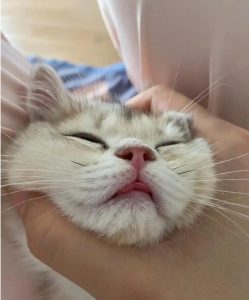When cats sneeze and tear up, pet owners often become concerned. This article delves into the reasons behind this behavior and offers care tips to help your feline friend regain its health.

Why Do Cats Sneeze and Tear Up?
Common Causes of Sneezing and Tearing in Cats
Infectious Diseases
-
Viral Infections: Feline herpesvirus and calicivirus are common culprits. They can cause upper respiratory infections in cats, leading to sneezing, tearing, red eyes, and increased eye secretions.
-
Bacterial Infections: Bacteria like Bordetella bronchiseptica and Chlamydia felis can also cause similar symptoms, sometimes accompanied by nasal discharge and coughing.
Allergic Reactions
Cats may be allergic to environmental allergens such as pollen, dust mites, mold, or certain ingredients in their food. This can lead to inflammation of the nasal and eye mucous membranes, resulting in sneezing and tearing.
Environmental Factors
-
Air Pollution: Dust, smoke, and chemical fumes in the air can irritate a cat’s respiratory tract and eyes, causing sneezing and tearing.
-
Temperature Changes: Sudden changes in temperature can lead to a cold in cats, causing sneezing and tearing.
Foreign Body Irritation
During play or exploration, cats may get foreign objects like dust, sand, or grass seeds in their eyes or nose. These can irritate the eyes and nasal passages, leading to sneezing and tearing.
Other Potential Health Issues
Chronic diseases or eye problems such as chronic rhinitis, conjunctivitis, or glaucoma can also cause cats to sneeze and tear up.
Care Tips for Cats That Sneeze and Tear Up
Keep the Environment Clean
Regularly clean your cat’s living area to reduce the presence of allergens and irritating substances. Use dust-free and eco-friendly cat litter, and maintain a clean and well-ventilated home.
Boost the Immune System
Provide a balanced diet rich in high-quality protein and comprehensive nutrition to enhance your cat’s immune system. Consider choosing cat food that follows the BARF (Biologically Appropriate Raw Food) diet concept.
Seek Timely Veterinary Care
If your cat’s symptoms persist or worsen, promptly take it to a pet hospital for examination and treatment. The veterinarian may recommend blood tests, X-rays, and other diagnostic procedures.
Keep Your Cat Warm
When a cat has a cold, it’s important to keep it warm. Make sure your cat has a warm bed to rest in and encourage it to drink warm water.
Supplement Nutrition
During a cat’s cold, it may become weak and lose its appetite. Pay attention to nutritional supplementation, providing more chicken, beef, etc., to maintain the cat’s bodily health.
Clean Nasal and Eye Discharge
Use a warm, moist cotton swab to gently wipe away any nasal or eye discharge from your cat. Be gentle to avoid harming your cat.
Conclusion
Sneezing and tearing in cats are not normal and are usually signs of underlying health issues. Possible causes include infections, allergies, environmental factors, and other potential diseases. As a pet owner, it’s essential to monitor your cat’s health closely, detect any abnormalities promptly, and take appropriate action. Maintaining a clean environment, boosting your cat’s immune system, and seeking timely veterinary care are all effective ways to help your cat recover and maintain good health. Let’s work together to ensure our cats live happy and healthy lives!
